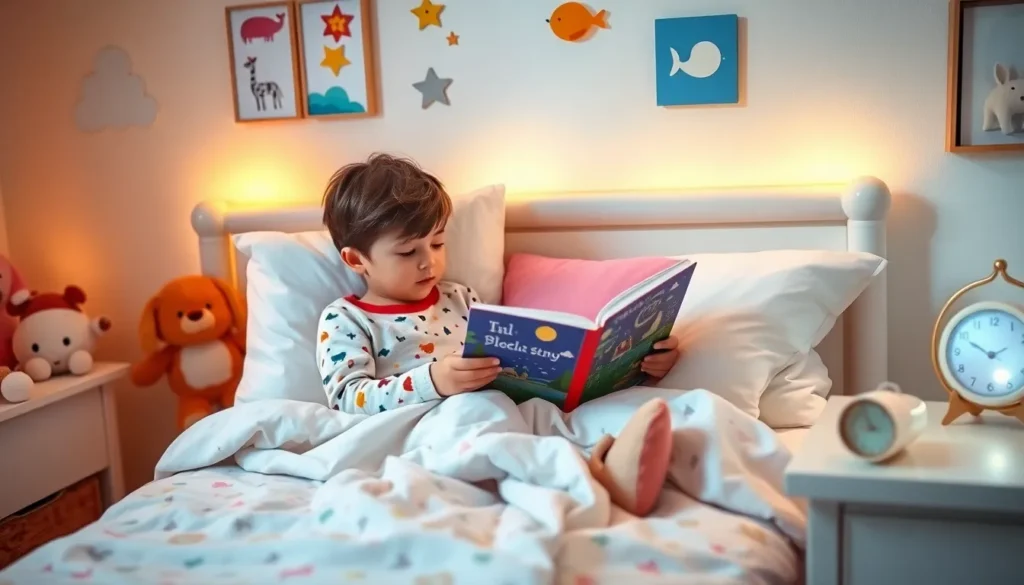When it comes to kids and sleep, parents often find themselves caught in a whirlwind of bedtime stories, midnight snacks, and the dreaded “just five more minutes” plea. It’s like trying to negotiate with a tiny, overly energetic lawyer who has a tight schedule centered around staying awake. But worry not. With the right strategies, everyone can sleep easy, and not just the kids. In this guide, we’ll explore essential sleep tips for kids that promote peaceful slumbers and happier mornings. So grab a bedtime snack (for you, not them), and let’s jump into the world of kid snoozing.
Table of Contents
ToggleUnderstanding the Importance of Sleep

Sleep is vital for every age group, but it’s especially crucial for children. During the night, their bodies undergo significant growth and development. Not getting enough shut-eye can lead to various issues, including irritability, difficulty concentrating, and even health problems. Imagine a cranky toddler suddenly morphing into a tiny hurricane by morning, definitely not the best way to start the day.
Also, sleep also plays a role in cognitive function. Kids need it for memory consolidation, emotional regulation, and problem-solving skills. By understanding how essential sleep is, parents can make informed decisions to prioritize it for their children.
How Much Sleep Do Kids Need?
The amount of sleep kids require varies by age. According to experts, here’s a basic breakdown:
- Infants (0-1 year): 14-17 hours per day
- Toddlers (1-3 years): 12-14 hours per day
- Preschoolers (3-5 years): 11-13 hours per day
- School-aged children (6-13 years): 9-11 hours per day
- Teenagers (14-17 years): 8-10 hours per day
Knowing these guidelines can be a game changer. It allows parents to create a realistic schedule. Want to avoid tantrums? Make sure they’re getting the right amount of sleep.
Creating a Sleep-Friendly Environment
A conducive sleep environment can work wonders. Parents might want to consider the following factors:
- Lighting: Keep it dim. Blackout curtains can prevent early morning light from turning little ones into early risers.
- Temperature: Keep the room comfortably cool. A sleepy environment should feel like a cozy blanket rather than a sauna.
- Noise: Invest in a white noise machine or use soothing sounds to drown out disruptive noises.
By tweaking the bedroom atmosphere, parents can create the perfect cocoon for their kiddos that beckons them into sweet dreams.
Establishing a Consistent Bedtime Routine
A predictable bedtime routine signals to children that it’s time to wind down. This can include:
- Taking a warm bath
- Reading a story
- Singing a lullaby
Each of these activities helps them transition from the hustle and bustle of the day to a calming state of mind. Consistency is key. Try to stick to the same bedtime each night. Kids thrive on routine, and establishing a soothing ritual can significantly enhance their sleep quality.
Tips for Encouraging Good Sleep Habits
While establishing routines is important, parents can also encourage good sleep habits in the following ways:
- Limit Screen Time: Blue light from screens can interfere with melatonin production. Consider setting a digital curfew at least an hour before bedtime.
- Physical Activity: Encourage daytime play. Active kids tend to sleep more soundly at night.
- Healthy Nutrition: A balanced diet fuels good sleep. Avoid heavy meals close to bedtime, and consider sleep-promoting snacks like bananas or whole grains.
Using engaging methods makes these sleep habits feel less like chores and more like fun activities.
Addressing Common Sleep Issues
Even with the best intentions, sleep issues can still crop up. Here are a few common challenges and strategies to combat them:
- Nightmares: Encourage open conversations about bad dreams. Feeling heard can help kids feel more secure.
- Bedwetting: This is quite common and usually resolves with time. Offering reassurance and patience is crucial.
- Sleepwalking: If children wander during slumber, it’s important to ensure their environment is safe. Consult a specialist if sleepwalking becomes a frequent concern.
Recognizing these issues and implementing practical solutions can lead to a more peaceful sleeping experience for everyone.






